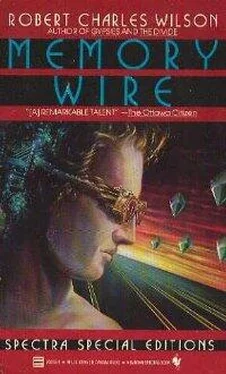Robert Wilson - Memory Wire
Здесь есть возможность читать онлайн «Robert Wilson - Memory Wire» весь текст электронной книги совершенно бесплатно (целиком полную версию без сокращений). В некоторых случаях можно слушать аудио, скачать через торрент в формате fb2 и присутствует краткое содержание. Год выпуска: 1987, ISBN: 1987, Издательство: Bantam Spectra, Жанр: Фантастика и фэнтези, на английском языке. Описание произведения, (предисловие) а так же отзывы посетителей доступны на портале библиотеки ЛибКат.
- Название:Memory Wire
- Автор:
- Издательство:Bantam Spectra
- Жанр:
- Год:1987
- ISBN:978-0-553-26853-9
- Рейтинг книги:4 / 5. Голосов: 1
-
Избранное:Добавить в избранное
- Отзывы:
-
Ваша оценка:
- 80
- 1
- 2
- 3
- 4
- 5
Memory Wire: краткое содержание, описание и аннотация
Предлагаем к чтению аннотацию, описание, краткое содержание или предисловие (зависит от того, что написал сам автор книги «Memory Wire»). Если вы не нашли необходимую информацию о книге — напишите в комментариях, мы постараемся отыскать её.
Memory Wire — читать онлайн бесплатно полную книгу (весь текст) целиком
Ниже представлен текст книги, разбитый по страницам. Система сохранения места последней прочитанной страницы, позволяет с удобством читать онлайн бесплатно книгу «Memory Wire», без необходимости каждый раз заново искать на чём Вы остановились. Поставьте закладку, и сможете в любой момент перейти на страницу, на которой закончили чтение.
Интервал:
Закладка:
They would not have created Pau Seco. They would not have expected it to be created.
She lay back in the darkness, weary and confused.
It had not been wholly her own idea to come here. It was an imperative she felt more than understood, a kind of homing instinct. Her own history faded back into darkness, lost in the fires that had swept the Floats fourteen years ago. Her childhood was a mystery. She had come into the Red Cross camps scalded and smoke-blinded and nearly mute. She had been cared for—adopted, though it was never legal—by an extended family of Guatemalan refugees; they fed her, clothed her, and practiced their English on her. They named her Teresa.
She was grateful but not happy. She remembered those days as a haze of pain and loss: the searing conviction that something valuable had been stolen from her. She became attached to a rag doll named Amy; she screamed if the doll was taken away. When Amy fell into a canal and disappeared beneath the oily seawater, she wept for a week. She adjusted to her new life in time, but the nameless pain never went away… until she discovered the pills.
One of her Guatemalan family, a hugely fat middle-aged woman named Rosita—whom the others called tia abuela —brought the pills home from the public health clinic. Rosita suffered from rheumatoid arthritis and took the pills for, as she put it, “ree- lif .” They were narcotic/analgesics keyed to the opiate receptors in the brain; Rosita was frankly addicted but, the clinic told her, the pills did not create a tolerance … the addiction would not get worse, they said, and that was good, because the arthritis would not get better.
Teresa, alone one afternoon in their antiquated houseboat, stole a pill from Rosita’s bottle and hid it under her pillow. The act was impetuous—partly curiosity, partly a dim intuition that the pill might work for her the kind of magic it worked for Rosita. In bed that night she swallowed it.
The effect was instantaneous and profound. Inside her a huge and unsuspected tide of fear and guilt rolled back. She closed her eyes and relished the warmth of her bed, smiling for the first time in years.
Tia Rosita was right, she thought. Ree- lif .
Rosita collected her prescription twice a month. Twice a month, Teresa took one off the top. Rosita did not seem to notice the thievery, or if she did, she did not suspect Teresa. And Teresa did not dare take more, for fear of drawing attention to herself.
Still, she lived for these moments. The pills seemed to detonate inside her, tiny explosions of purity and peace. Words like loneliness and loss began to make sense to her; she realized for the first time that they might not be permanent or universal.
When she was sixteen one of the boys she had come to think of as her brother, a rangy twenty-year-old named Ruy, took her out to the empty margin of the tidal dam and showed her a fistful of pink-and-yellow spansules—the same kind Rosita got from the clinic.
She could not help herself. She grabbed. Ruy pulled his hand away, laughing; a cloud of sea gulls whirled up from the concrete pilings. “Right,” he said. “I thought so.”
She stared covetously at his clenched fist. “You can get those?”
“Many as I want.”
“Can I buy them?”
“Acaso.” He shrugged loftily. Maybe.
“How much?”
“How much you got?”
She had nothing. She had been going to the charity school up in the North Floats, where her English teacher called her “a good pupil” and her art instructor called her “talented.” But she didn’t care about the school. She could quit, she thought, get a job, get some money… acaso.
“When you do,” Ruy said—walking away, heartbreakingly, with the pills still imprisoned in his hand— “then you talk to me.”
But Rosita, older and more gnarled but no less vigilant, wouldn’t let her leave school. “What kind of job are you going to get? Be a whore down by the mainland, like your sister Livia?” She shook her head. “Public Works is pulling out of this place, you know. Too many uncertified people. No documents, no green cards, no property deeds. You’re lucky you have a school. Maybe won’t have one much longer, you think about that?”
But it was Rosita’s anger and not any practical consideration that deterred her. She stayed in school, maintained her habit, and ignored Ruy when he taunted her with his apparently endless supply of drugs. Until, one day, her art instructor complimented her on a collage she had assembled. She had a real talent, he said. She could go somewhere with it.
It was a strange idea. She enjoyed putting together collages and sculptures, it was true; sometimes it felt almost as good as the pills made her feel. It was almost as if someone else were doing the work with her hands, some part of her she had lost in the fire, maybe, making its presence felt. She would abandon herself to the work and find that hours had passed: it was a good feeling.
She had not thought of making money with it. It looked like an outside chance. Still, she packed a bag lunch one Sunday and hiked along the pontoon bridges to the mainland, to the art galleries up the coastal highway. The mainland frightened her. She was not accustomed to the roaring of trucks and automobiles; in the Floats you saw mostly motor launches, and those only in the big canals. And there was the eerie solidity of the ground beneath her feet, rock and sand and gravel wherever she turned.
She examined the artwork offered for sale in these landlocked places. Crystal paintings, junk sculptures, polished soapstone. Most of it had come from the Floats and was considered—she inferred from the way people spoke —a kind of folk art. Some of the pieces were very good and some were not, but she realized with a degree of surprise that her art instructor had been right—there was nothing here beyond her talents. She lacked the tools to tackle some of these projects, but the work she had done with scrap metal salvaged from the dumpboats was as good as at least half of what she had seen that day. Possibilities here, she thought.
Two weeks later she carried three small pieces across the pontoon and chain-link bridges to a place called Arts by the Sea. She showed them to the owner, a woman only slightly younger than Rosita. The woman was named Mrs. Whitney, and she was skeptical at first, but then—as Teresa unwrapped the oilcloth from her work—impressed. Her eyes widened, then narrowed. “Such mature work!” She added, “For someone your age.”
“You’ll buy it?” Teresa asked.
“We sell on commission. But I can offer you an advance.”
It was, Teresa learned later, a pittance, a token payment; but at the time it was more money than she had seen in one place.
She took it to Ruy and offered him half of it. He gave her enough pills to fill up both her cupped hands. That night she took two.
Ree-lif. It flowed through her like a river. She rationed herself to one a night, to make them last, and worked in her spare time on another sculpture for Mrs. Whitney. Mrs. Whitney paid her almost double for it, and that was good; but Ruy’s prices had begun to escalate too. She paid but she hated him for it. Ruy had become suddenly important to her, and she acquired the habit of observing him. He moved down the pontoon alleys swaggering, his bony hips thrust forward. “ Muy macho,” Rosita always said when he struck these poses at home, but out here there was no one to deflate him. He hung around with his similarly hipshot friends by the graffiti-covered tidal dam; she had seen him dealing pills there. One afternoon—nursing her hatred— she cut classes and followed him halfway to the mainland, to a tiny pontoon shack listing in the North Floats, a gasoline pump gushing out bilge into the dirty canal beside it. Ruy went in with his hand on his wallet and came out clutching a fat paper bag.
Читать дальшеИнтервал:
Закладка:
Похожие книги на «Memory Wire»
Представляем Вашему вниманию похожие книги на «Memory Wire» списком для выбора. Мы отобрали схожую по названию и смыслу литературу в надежде предоставить читателям больше вариантов отыскать новые, интересные, ещё непрочитанные произведения.
Обсуждение, отзывы о книге «Memory Wire» и просто собственные мнения читателей. Оставьте ваши комментарии, напишите, что Вы думаете о произведении, его смысле или главных героях. Укажите что конкретно понравилось, а что нет, и почему Вы так считаете.












